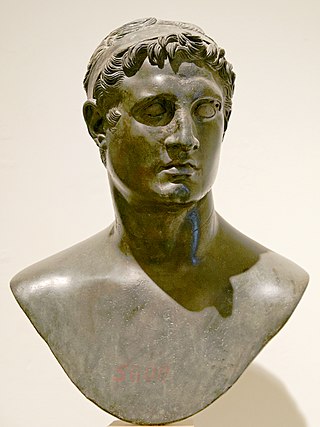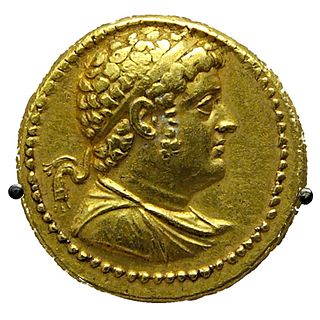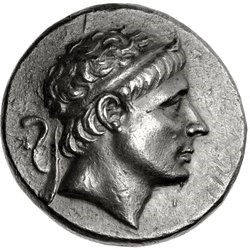
The Ptolemaic dynasty, also known as the Lagid dynasty, was a Macedonian Greek royal house which ruled the Ptolemaic Kingdom in Ancient Egypt during the Hellenistic period. Reigning for 275 years, the Ptolemaic was the longest and last dynasty of ancient Egypt from 305 until its incorporation into the Roman Republic in 30 BC.
Year 150 BC was a year of the pre-Julian Roman calendar. At the time it was known as the Year of the Consulship of Flamininus and Balbus. The denomination 150 BC for this year has been used since the early medieval period, when the Anno Domini calendar era became the prevalent method in Europe for naming years.

Ptolemy III Euergetes was the third pharaoh of the Ptolemaic dynasty in Egypt from 246 to 222 BC. The Ptolemaic Kingdom reached the height of its military and economic power during his kingship, as initiated by his father Ptolemy II Philadelphus.
Year 246 BC was a year of the pre-Julian Roman calendar. At the time it was known as the Year of the Consulship of Crassus and Licinus. The denomination 246 BC for this year has been used since the early medieval period, when the Anno Domini calendar era became the prevalent method in Europe for naming years.
Antiochus is a Greek male first name, which was a dynastic name for rulers of the Seleucid Empire and the kingdom of Commagene. In Jewish historical memory, connected with the Maccabean Revolt and the holiday of Hanukkah, "Antiochus" refers specifically to Antiochus IV Epiphanes.

Ptolemy II Philadelphus was the pharaoh of Ptolemaic Egypt from 284 to 246 BC. He was the son of Ptolemy I, the Macedonian Greek general of Alexander the Great who founded the Ptolemaic Kingdom after the death of Alexander, and Queen Berenice I, originally from Macedon in northern Greece.

Ptolemy IV Philopator was the fourth pharaoh of Ptolemaic Egypt from 221 to 204 BC.

Berenice I was Queen of Egypt by marriage to Ptolemy I Soter. She became the second queen, after Eurydice, of the Ptolemaic dynasty of Egypt.

Antiochus II Theos was a Greek king of the Hellenistic Seleucid Empire who reigned from 261 to 246 BC. He succeeded his father Antiochus I Soter in the winter of 262–61 BC. He was the younger son of Antiochus I and princess Stratonice, the daughter of Demetrius Poliorcetes.

Antiochus VIII Epiphanes/Callinicus/Philometor, nicknamed Grypus, was the ruler of the Hellenistic Seleucid Empire from 125 to 96 BC. He was the younger son of Demetrius II and Cleopatra Thea. He may have spent his early life in Athens and returned to Syria after the deaths of his father and brother Seleucus V. At first he was joint ruler with his mother. Fearing her influence, Antiochus VIII had Cleopatra Thea poisoned in 121 BC.
Epiphanes, meaning "God Manifest" or "the Glorious/Illustrious", is an ancient Greek epithet borne by several Hellenistic rulers:

Attalus II Philadelphus was a ruler of the Attalid kingdom of Pergamon and the founder of the city of Attalia (Antalya).
Ptolemy was an Alexandrian mathematician, astronomer, geographer and astrologer.

The Ptolemaic Kingdom or Ptolemaic Empire was an Ancient Greek state based in Egypt during the Hellenistic period. It was founded in 305 BC by the Macedonian general Ptolemy I Soter, a companion of Alexander the Great, and ruled by the Ptolemaic dynasty until the death of Cleopatra VII in 30 BC. Reigning for nearly three centuries, the Ptolemies were the longest and final dynasty of ancient Egypt heralding a distinctly new era for religious syncretism and the blending of a new Greco-Egyptian culture.
Euergetes, meaning "the Benefactor", was an epithet, an honoring title, given to various benefactors. Euergetism was the practice of high-status and wealthy individuals distributing part of their wealth to the community. For example,
Aëtus son of Aëtus was a priest in the Ptolemaic cult of Alexander the Great under the reign of Ptolemy V. According to the inscription on the Rosetta Stone Aëtus in 196 BC held the annual priesthood "of Alexander and the Saviour Gods and the Sibling Gods and the Beneficent Gods and the Sibling-loving Gods and the Father-loving God", that is, of Alexander the Great, Ptolemy I Soter and his wife Berenice I Soter, Ptolemy II and his wife and sister Arsinoe II, Ptolemy III Euergetes and his wife Berenice II Euergetis, Ptolemy IV Philadelphus and his wife and sister Arsinoe III Philadelphia, and finally of the young king Ptolemy V Philopator who was still on the throne. All these were worshipped as gods in Ptolemaic Egypt. Aëtus is thought to have been the grandson of Aëtus son of Apollonius, a native of Aspendus in Pamphylia, who became Strategos or military governor of Cilicia under the reign of Ptolemy II.
Lysimachus of Telmessos, also known as Lysimachus II was a Greek Prince from Asia Minor who served as a Ptolemaic Client King under the Ptolemaic dynasty of Ancient Egypt.
Philopator, meaning "father-loving", was a common royal epithet among Hellenistic monarchs:
Apollonius was the dioiketes or chief finance minister of Egypt during the reign of Ptolemy II Philadelphus. Little is known about his personal life; in ancient documents, he is called simply "Apollonius the dioiketes" without recording his home city or his father's name. But a great amount of information has survived about his public role, in the archive of papyri kept by his assistant Zenon.
This page is based on this
Wikipedia article Text is available under the
CC BY-SA 4.0 license; additional terms may apply.
Images, videos and audio are available under their respective licenses.








